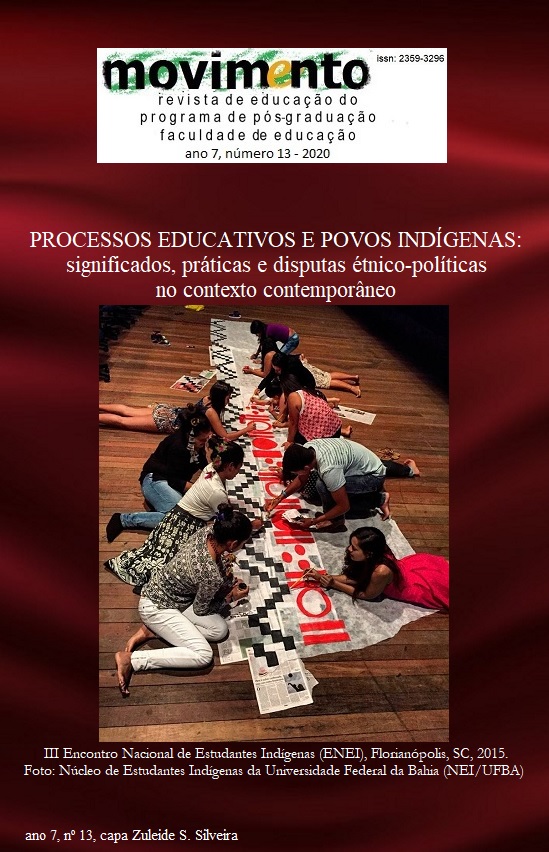APRESENTAÇÃO
DOI:
https://doi.org/10.22409/mov.v7i13.43961Resumo
As crises socioeconômicas e a vigência ou fortalecimento de governos neoliberais atuam invisibilizando as demandas dos povos por políticas educativas que quebrem as práticas e as perspectivas colonizadoras e racistas instaladas nos sistemas escolares vigorantes. Paralelamente, as comunidades, em alguns casos nucleadas em organizações maiores, lutam por abrir espaços de reconhecimento e de legitimação de projetos educativos interculturais que visem a gerar saberes e práticas que ativem novos diálogos em relação à natureza, aos fatos históricos, ao reconhecimento de suas memórias, à leitura dos corpos, aos mecanismos de reciprocidade, à diversidade de linguagens etc. Neste contexto, o Dossiê Processos educativo e povos indígenas: significados, práticas no contexto contemporãneo , que ora apresentamos, tem como objetivo discutir criticamente as políticas e as propostas educativas de/para/com os povos indígenas (em diferentes níveis escolares e contextos comunitários e urbanos), a fim de compreender os significados que esses povos lhes atribuem, em consonância com os seus projetos de vida e as negociações, as tensões e as contestações que ocorrem entre suas aspirações e a execução de políticas educativas nos estados nacionais.
APRESENTATION
Socioeconomic crises and the validity or strengthening of neoliberal governments act by making peoples' demands invisible for educational policies that break the colonizing and racist practices and perspectives installed in the existing school systems. At the same time, communities, in some cases nucleated into larger organizations, struggle to open spaces for recognition and legitimation of intercultural educational projects aimed at generating knowledge and practices that engage in new dialogues in relation to nature, historical facts, recognition of their memories, reading of bodies, mechanisms of reciprocity, diversity of languages, etc. In this context, the Dossier Educational processes and indigenous peoples: meanings, practices in the contemporary context, which we present here, aims to critically discuss the policies and educational proposals of/from/with indigenous peoples (at different school levels and community and urban contexts), in order to understand the meanings that these peoples attribute to them, in line with their life projects and negotiations, the tensions and disputes that occur between their aspirations and the implementation of educational policies in the national states.
Downloads
Referências
BENITES, Sandra. Nhe'e, reko porã rã: nhemboea oexakar. Fundamento da pessoa guarani (educação tradicional), nosso bem-estar futuro e o olhar distorcido da escola. TCC, Licenciatura Intercultural Indígena do Sul da Mata Atlântica, UFSC, 2015.
BOURDIEU, Pierre. Razones prácticas. Sobre la teoría de la acción. Barcelona: Anagrama. 1997.
ORTNER, Sherry. Antropología y Teoria Social: Cultura, Poder y Agencia. 1°edición San Martin: Universidad Nacional Gral San Martín. UNSAM EDITA, 2016
SEGATO, Rita Laura. La Nación y sus Otros: raza, etnicidad y diversidad religiosa en tiempos de Políticas de la Identidad. Buenos Aires, Prometeo Libros, 2007.
TASSINARI, Antonella Maria Imperatriz. Escola indígena: novos horizontes teóricos, novas fronteiras de educação. In SILVA, Aracy Lopes da; FERREIRA, Mariana Kawall Leal (Orgs). Antropologia, história e educação: a questão indígena e a escola. São Paulo: Global, 2001.
WALSH, Catherine. Interculturalidad crítica y educación intercultural. In VIAÑA; TAPIA, WALSH (Orgs.) Construyendo Interculturalidad Crítica. La Paz: Instituto Internacional de Integración del Convenio Andrés Bello, 2010.
Downloads
Publicado
Edição
Seção
Licença
- Autores mantém os direitos autorais e concedem à revista o direito de primeira publicação, com o trabalho simultaneamente licenciado sob a Creative Commons - Atribuição-NãoComercial 4.0 Internacional. que permite o compartilhamento do trabalho com reconhecimento da autoria e publicação inicial nesta revista.
- Autores têm autorização para assumir contratos adicionais separadamente, para distribuição não-exclusiva da versão do trabalho publicada nesta revista (ex.: publicar em repositório institucional ou como capítulo de livro), com reconhecimento de autoria e publicação inicial nesta revista.
- Autores têm permissão e são estimulados a publicar e distribuir seu trabalho online (ex.: em repositórios institucionais ou na sua página pessoal) depois da publicação nesta revista.
- As fontes indicadas, as ideias e as opiniões expressas são de exclusiva responsabilidade dos autores, não refletindo, necessariamente, as opiniões da revista.

